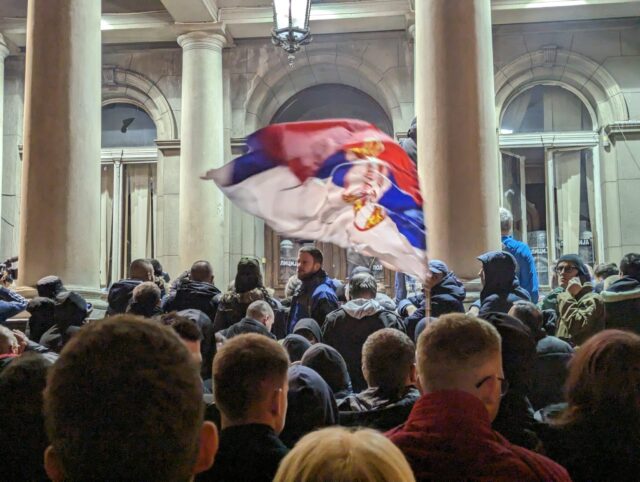
Moscow Defends Serbia’s Government Against Opposition Protests
Publication: Eurasia Daily Monitor Volume: 21 Issue: 8
By:

Executive summary:
- The Kremlin views Serbia as a strategic asset in the Balkans that expands Russia’s geopolitical reach, weakens Western cohesion, and undermines transatlantic institutions.
- The Serbian government benefits from its alliance with Moscow by having an advocate on the UN Security Council to block Kosovo’s membership and campaign against its official recognition.
- The Vučić government favors Russia’s victory in the war against Ukraine, as this would bolster Moscow’s global stature in challenging Western interests and reinforce Serbia’s agenda to regain Kosovo as well as dominate Bosnia-Herzegovina and Montenegro.
Since the widely criticized parliamentary elections on December 17, 2023, mass demonstrations in Belgrade have revealed substantial opposition to the ruling Progressive Party and the increasingly authoritarian rule of President Aleksandr Vučić. The protests, led by the Serbia Against Violence coalition, have also exposed Moscow’s fear of losing Serbia as its key ally in the Balkans (Srbija Protiv Nasilja, December 17, 2023). The Kremlin has condemned the public protests against Serbia’s defrauded general elections as Western attempts to overthrow the government and orchestrate another “Maidan coup” (RT, December 25, 2023). Russian officials have warned of an imminent “color revolution” similar to Ukraine’s democratic revolution that took place from November 2013 to February 2014.
International observers from the European Union and the Organization for Security and Co-operation in Europe reported major irregularities in the December elections, including “vote buying” and “ballot box stuffing,” and have called for a probe into their conduct (Radio Free Europe/Radio Liberty, December 19, 2023). Domestic condemnation of the elections was compounded by the brutal beating and hospitalization of opposition leader Nikola Sandulović, apparently at the hands of Serbian security forces (Euroactiv, January 8). Most recently, on January 16, thousands of opposition supporters rallied peacefully in Belgrade to demand the annulment of the elections and the holding of a new ballot (Danas, January 16).
Russian officials are defending the Serbian government due to the benefits Vučić has delivered to Moscow since he first came to power in February 2017. The Kremlin views Serbia as a strategic asset in the Balkans that plays a central role in expanding Moscow’s geopolitical reach, weakening Western cohesion, and undermining transatlantic institutions. Belgrade’s opposition to membership in the North Atlantic Treaty Organization (NATO) serves Kremlin interests, having failed to derail Montenegro and North Macedonia’s entry into the alliance. Maintaining the dispute over state recognition between Serbia and Kosovo also unsettles the region and foments ethnic nationalism (Radio Slobodna Evropa, March 11, 2023). Such unresolved conflicts enable the Kremlin to claim that, despite its expansion, NATO has failed to stabilize the Western Balkans. Moscow thereby endeavors to discredit the US presence in the region while justifying its own involvement.
Vučić’s government benefits from its alliance with Moscow by having an advocate on the UN Security Council to block Kosovo’s membership and campaign internationally against its official recognition. The Kremlin also reinforces Belgrade’s ambitions in Bosnia-Herzegovina and Montenegro through its looming presence in the media landspace as well as political and religious connections that help fan Serbian nationalism and weaken state institutions. The Serb-controlled Republika Srpska in Bosnia-Herzegovina has become a client state of Russia, as evidenced by its expanding diplomatic, political, economic, and security connections with Moscow (The Geopost, January 16). Additionally, the new government in Montenegro is supported by pro-Moscow Serbian parties that seek to transform the country into Belgrade’s vassal (Analitika December 27, 2023).
Serbia’s ties with Russia have substantially expanded during Vučić’s presidency. In October 2019, Vučić’s government signed a free-trade agreement with the Moscow-led Eurasian Economic Union, despite strong opposition from the European Union (Radio Free Europe/Radio Liberty, October 25, 2019). Vučić has refused to join the Western sanctions regime against Russia for its invasion and partition of Ukraine, claiming that this would be a hostile and counter-productive policy. Belgrade has also expanded the Russian-Serbian Humanitarian Center in Niš in southern Serbia, working closely with Russia’s security services (European Western Balkans, December 24, 2018). The center enhances Moscow’s intelligence-gathering efforts and the training of operatives throughout the Balkans. It is located near the Kosovo border, where a small contingent of NATO and US troops is stationed. Additionally, Serbia continues to acquire heavy weapons from Moscow, including anti-aircraft systems, fighter jets, and attack helicopters, despite Washington’s persistent warnings of sanctions (Defense News, January 3, 2022). The Vučić government periodically threatens a direct military intervention in Kosovo to allegedly protect the Serbian population from the government in Pristina, similar to Russia’s assertions toward Ukraine on the eve of the current war. Moscow complains internationally against any arming of Kosovo’s security forces to defend the state while praising Serbia’s military build-up (Pravda.ru, January 15).
Serbia is also actively recruiting fighters for Russia’s war against Ukraine. According to French intelligence services, citing the Russian opposition, in August 2023, Moscow hired an initial contingent of 500 private Serbian soldiers for immediate deployment to Ukraine (Intelligence Online, August 22, 2023). The recruiters themselves were either former members of Serbian Special Forces involved in the wars in Bosnia-Herzegovina and Kosovo in the 1990s or fought with the notorious Wagner Group in Ukraine in 2014 and Syria after 2016. A “Serbian battalion” of volunteers recruited in the Balkans is planned to join the ranks of Russia’s 106th Guards Airborne Division (The War Zone, October 18, 2023).
Serbian officials claim they oppose any recruitment of mercenaries for the war in Ukraine. The government’s close links with ultra-nationalist networks and its support for Moscow’s objectives belies these denials. The Vučić government favors Russia’s victory in the war against Ukraine and its control over captured territories for two core reasons. First, a Russian victory would bolster the Kremlin’s global stature in challenging US and EU interests, enhancing Moscow’s alliance with Belgrade. Second, it would reinforce Serbia’s agenda to regain Kosovo as well as dominate Bosnia-Herzegovina and Montenegro with intensified assistance from a more assertive Russia.



